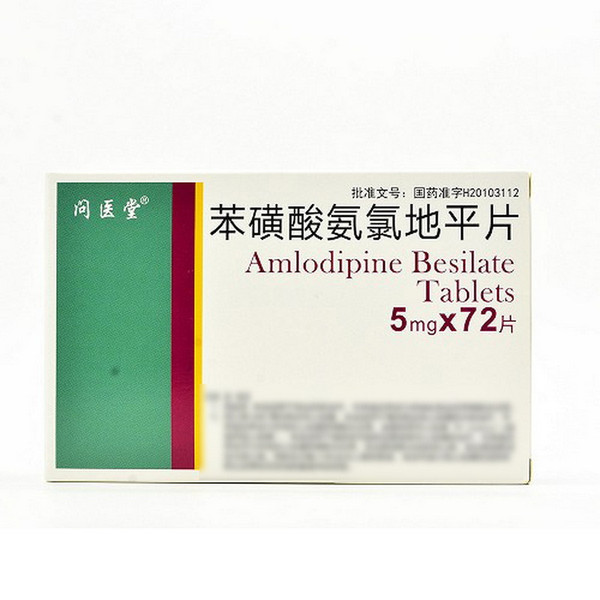Product Overview
[Drug Name]
Generic Name: Amlodipine Besylate Tablets
Trade Name: Wenyitang Amlodipine Besylate Tablets 5mg*72 Tablets
Pinyin Full Code: WenYiTang BenHuangSuanAnLvDiPingPian 5mg*72 Tablets
[Main Ingredient]
Amlodipine Besylate.
[Properties]
This product is white or off-white tablets.
[Indications/Main Functions]
1. Hypertension. 2. Coronary heart disease (CDA), chronic stable angina, vasospastic angina (Prinzmetal's or variant angina), and angiographically confirmed CHD.
[Specifications]
5mg*72 tablets
[Dosage and Administration]
Oral. For the treatment of hypertension: The usual starting dose for this drug is 5mg once daily, with a maximum dose of 10mg once daily. For patients who are small, frail, elderly, or have hepatic impairment, the starting dose is 2.5 mg once daily; this dose can also be used in combination with other antihypertensive medications. Dose adjustments should be made based on individual patient response. Generally, dose adjustments should be initiated after 7-14 days. If clinically necessary, dose adjustments may be made more quickly under close patient monitoring. For the treatment of angina pectoris, the initial dose is 5-10 mg once daily. Lower doses are recommended for elderly patients and those with hepatic impairment. The effective dose for most patients is 10 mg once daily.
[Adverse Reactions]
Amlodipine is well tolerated. In placebo-controlled clinical trials for the treatment of hypertension or angina pectoris, the most common adverse events were flushing, fatigue, edema, dizziness, headache, abdominal pain, nausea, palpitations, and somnolence. No significant clinical laboratory abnormalities related to amlodipine were observed in these clinical trials. Allergic reactions are rare and include pruritus, rash, angioedema, and erythema multiforme. Similar to other calcium channel blockers, the following adverse events have been reported rarely, but these events are difficult to distinguish from the natural history of the underlying disease: myocardial infarction, arrhythmias (including bradycardia, ventricular tachycardia, and atrial fibrillation), and chest pain.
[Contraindications]
Amlodipine besylate tablets are contraindicated in patients with allergies to dihydropyridines.
[Drug Interactions]
1. Cimetidine, grapefruit juice, and acidogens: Coadministration does not alter the pharmacokinetics of this drug. 2. Atorvastatin, digoxin, and ethanol: This drug does not affect the pharmacokinetics of these agents. 3. Sildenafil: Single-dose sildenafil (Viagra) has no effect on the pharmacokinetics of this drug in patients with essential hypertension. The two drugs produce an independent antihypertensive effect when taken together. 4. Warfarin: This drug does not alter the prothrombin action time of warfarin. 5. Digoxin, phenytoin, and warfarin: Concomitant use with amlodipine besylate tablets has no effect on plasma protein binding. 6. Anesthetics: Concomitant use of inhaled hydrocarbons with this drug may cause hypotension. 7. Nonsteroidal anti-inflammatory drugs: Indomethacin, in particular, may attenuate the antihypertensive effect of this drug. 8. Hormones: Concomitant use may cause fluid retention and increase blood pressure. 9. Pyrrolidone: Concomitant use may increase protein binding of this drug, resulting in changes in plasma concentrations. 10: Concomitant use may cause neurotoxicity, including nausea, vomiting, diarrhea, ataxia, tremor, and/or numbness; caution is advised. 11. Sympathetic amines: May attenuate the antihypertensive effect of this drug.
[Precautions]
1. Angina and/or Myocardial Infarction: Rare. Patients with severe obstructive coronary artery disease may experience an increase in the frequency, duration, and/or severity of angina attacks, or the development of acute myocardial infarction, when initiating or increasing the dose of calcium channel blockers. The mechanism is unknown. 2. Hypotension: Because this drug gradually produces vasodilation, acute hypotension rarely occurs with oral administration. However, caution should be exercised when using this drug in combination with other peripheral vasodilators, especially in patients with severe aortic valve stenosis. 3. Patients with Heart Failure: Calcium channel blockers should be used with caution in patients with heart failure. 4. Patients with Hepatic Insufficiency: This drug should be used with caution in patients with severe hepatic insufficiency. 5. Patients with Renal Failure: The starting dose for patients with renal failure can remain unchanged. 6. Amlodipine Besylate Tablets can be used safely in patients with obstructive pulmonary disease, well-compensated heart failure, peripheral vascular disease, diabetes, and lipid disorders.
[Pediatric Use]
The recommended dose of this drug for hypertensive children aged 6 to 17 years is 2.5 mg to 5 mg once daily. No studies have been conducted in pediatric patients using doses exceeding 5 mg daily.
[Geriatric Use]
No clinical studies have been conducted to determine whether elderly patients (over 65 years) respond differently to this drug than younger patients. Other clinical studies have not demonstrated differences in responses between elderly and younger patients. Generally, given that elderly patients are often more likely to have impaired liver, kidney, or cardiac function and to have concurrent illnesses or take other medications, dose selection for elderly patients should be cautious, and a lower dose should generally be initiated. Elderly patients have decreased clearance of this drug, resulting in an approximately 40-60% increase in the area under the curve (AUC), so a lower starting dose is recommended.
[Overdose]
Severe overdose may result in excessive peripheral vasodilation with marked hypotension and reflex tachycardia.
[Pharmacology and Toxicology]
Amlodipine is a dihydropyridine calcium antagonist (also known as a calcium ion antagonist or slow-channel blocker) that inhibits the transmembrane influx of calcium ions into vascular smooth muscle and myocardium. Experimental data indicate that amlodipine binds to both dihydropyridine and non-dihydropyridine binding sites. The contraction of myocardial and vascular smooth muscle depends on the influx of extracellular calcium ions through ion channels. Amlodipine selectively inhibits transmembrane calcium transport, with a stronger effect on vascular smooth muscle cells than on myocardial cells. Negative inotropic effects have been observed in vitro, but these effects have not been observed in live animals at clinically therapeutic doses. Amlodipine does not affect serum calcium concentrations. Within the physiological pH range, amlodipine is an ionized complex (pKa = 8.6), achieving its gradual onset of action through slow binding and dissociation at the calcium channel receptor binding site.






